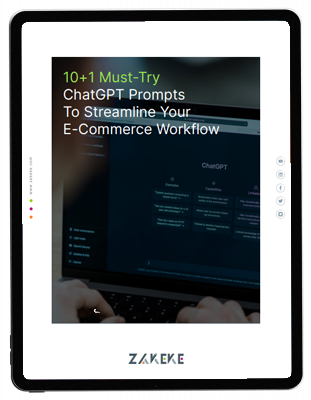Artificial intelligence implementation is changing the digital landscape. Multiple industries already benefit from AI, and advertisers want to be part of that revolution, too.
From an advertising perspective, artificial intelligence could change how advertisers collect and process data to understand consumer behavior. It’s arguably the standout AI for e-commerce benefits.
Optimizing operations and driving business growth is also easier when you have machine learning and AI automation to help you.
Having said that, it’s important to realize that what looks great theoretically might not translate into practice.
Let’s take a look at how practical artificial intelligence is in the context of personalization and how AI advertising is revolutionizing traditional adv marketing campaigns.
How AI is changing advertising: AI in Ad Personalization
Reaching the right audience is key if a business wishes to drive traffic and conversions. Instead of creating lackluster ads and targeting random audiences, brands ought to find a formula that speaks to the targeted demographic.
For retargeting marketing, it’s easier because you already have enough insights on prior customer interactions with the website. On the other hand, if a brand wants to reach out to an entirely new audience, it will have to go beyond.
The first step is to identify an audience. Brands are finding it harder and harder to utilize third-party data due to various regulations, which makes it harder to find potential leads.
How Does AI Help Brands Find Data?
This is where artificial intelligence comes into play. It’s sophisticated enough to provide a larger amount of useful data. Brands can then utilize data in their advertising campaigns.
One instance of AI helping brands out is how it’s capable of scanning the internet and collecting information without breaking GDPR and other regulations.
A human mind would struggle to look past the primary context in digital content. Or rather, trying to consider everything is simply not efficient.
AI scans the web and considers not just the main page. It also scans specific phrases and keywords to determine what ticks the consumers. Moreover, AI for e-commerce advertising wouldn’t offer as much value if it worked only for a specific media channel. No, AI considers different media channels when collecting data.
Businesses shouldn’t forget first-party data. Some users willingly share their details when subscribing to newsletters, for instance. It’s another piece of the puzzle that AI can and should utilize.
How Does That Look in Practice? How To Use AI To Advertise?
It’s easier to understand how AI helps when you look at practical examples. Here are two:
Example #1
A local gym wants to attract new customers, but it doesn’t have access to people’s browsing history.
AI could be used to scan the internet and social media, particularly looking for events related to sports.
A marathon, an archery competition, a basketball match, and so on. Even people who interacted with a sporting goods store that advertised discounts on their Facebook or Instagram page could fit the profile of someone who might be interested in going to a gym.
Example #2
An internet book store that specializes in the fantasy genre wants to grow its business.
An interest in fantasy goes beyond books. Video games, board games, TV shows, movies, and animation have a fair amount of fantasy as a genre.
AI could analyze trending fantasy topics and help the store push books that fit the trends.
It could even help bookstores find new writers who shared their work online but never thought about becoming a published author.
Ultimately, AI in e-commerce and advertising analyzes the context and segments specific bits depending on the territory, age, and other demographics.
Ethical Considerations About AI Advertising
As AI continues to make its presence grow in the digital world, there are more and more concerns about what it means from an ethical point of view.
Not all consumers are against sharing personal data if it means a better ad experience, but this doesn’t apply to everyone.
AI moves faster than humans; thus, harnessing data is ahead of upholding privacy rights. Regulators may not keep up with the advancements. Not to mention that different countries perceive personal data differently.
Brands that take advantage of AI have the upper hand over consumers. Abusing the system to profit and ignoring the aftermath of what such practice could lead to sounds scary.
Data protection shouldn’t be an afterthought, particularly when AI algorithms are capable of so much.
Challenges and Limitations
Despite the clear benefits artificial intelligence offers, it’s still far from perfect. Brands that plan to utilize AI advertising for e-commerce and can expect to face certain challenges and limitations.
Besides ethical concerns, personal privacy, and overall cybersecurity, AI also presents limitations due to data biases.
Valuable insights and automation are still a hit or miss, particularly when vast amounts of data are involved.
Data biases lead to unfair targeting and inefficient ad campaigns. Relying entirely on AI is hardly a sound strategy. Until it’s perfect (and who knows when that’ll be), brands should still listen to customer feedback and minimize potential errors.
Finally, either the AI itself or the tools used in tandem with it might be out of date, leaving one aspect of advertising behind.
Still, advertisers will continue to look for ways to polish AI and benefit from it even more. The technology already proved its usefulness, and it’ll be interesting to see what it brings in the future.

Laura Alexander
E-Commerce Content Manager
Laura Alexander is a freelance digital content manager and copywriter. Specializing in tech, ecommerce, and educational content, she had her work appear in publications like Omnikick, Pomodoneapp, Sortlist, and Price2Spy.














